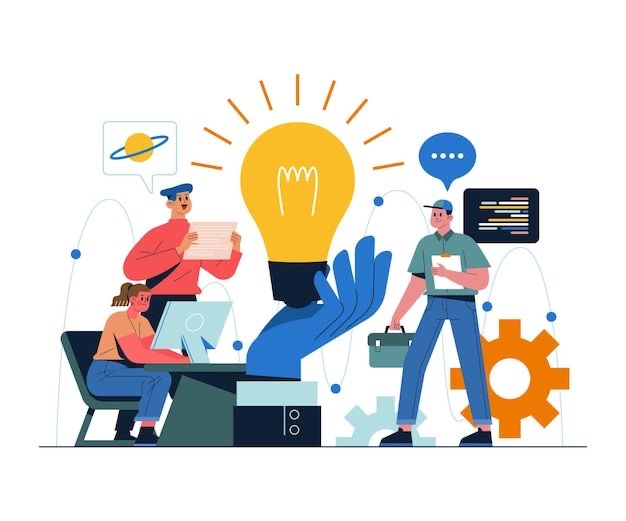
Azka Ajuwath
If someone from the year 1900 could magically land in our world today, I’m convinced they’d think they had accidentally walked onto the set of a sci-fi movie. Cars that don’t drink petrol, but sip electricity. Machines that talk back to you like an overconfident cousin. Food arriving at your doorstep without you moving a muscle. And the most unbelievable thing people working, learning, shopping, and even falling in love without leaving home.
But no, we’re not living in some futuristic film. This is real life in 2025. And all of it is thanks to modern-day innovation the fancy term for “making something better so life gets easier, faster, or more fun.”
Artificial Intelligence, or AI, is basically the art of teaching computers to think like humans… without the bad habits, of course.
Think about it:
•Netflix recommending a movie that actually suits your mood? AI.
•Google Maps warning you about a traffic jam before you even start your car? AI.
•Your phone unlocking just by looking at you (even on a bad hair day)? Yep, AI.
AI is like that friend who knows you so well, they finish your sentences except this friend works 24/7, never complains, and can multitask better than your entire family combined. It’s even saving lives in hospitals, helping farmers grow better crops, and yes, sometimes even writing stories like this (though I promise this one is from me, not a robot).
We’ve been powering our world with coal, oil, and gas for ages. The problem? They’re running out, and they’re heating up the planet like a giant oven set to “bake.”
Now, thanks to innovation, we’ve got cleaner options: solar panels soaking up sunshine, wind turbines dancing in the breeze, and hydropower using rivers to make electricity.
And electric cars? Oh, they’re no longer a rich-people-only dream. A decade ago, spotting a Tesla was like spotting a celebrity. Now, they’re quietly gliding down streets all over the world. Even buses, delivery vans, and tuk-tuks are going electric. Imagine a future where traffic noise is just the sound of tires on the road.
Not long ago, if you were sick, doctors relied mostly on experience, hope, and a few basic machines. Today? It’s like stepping into a health-tech wonderland.
•Smartwatches and fitness bands check your heart rate, count your steps, and even warn you if something’s off.
•Robotic surgeries mean tiny cuts instead of giant scars, so you heal faster and with less pain.
•AI-assisted diagnoses can spot illnesses like cancer before they get serious.
Remember how COVID-19 vaccines came out in record time? That was innovation racing against the clock and winning.
I don’t know about you, but I grew up watching movies where people told their house to turn on the lights, and it actually listened. Now? That’s just Tuesday.
The Internet of Things (IoT) means everyday items are now “smart” and connected to the internet.
•Your fridge can send you a message when you’re low on milk.
•Your lights turn off when you leave the house.
•You can turn on the air conditioner while you’re still on your way home (hello, comfort!).
It’s not just for convenience either. Elderly people can have motion sensors that alert family if something’s wrong. It’s like giving your home a brain a friendly one, hopefully.
Gone are the days when “going to work” meant sitting in traffic for an hour, wearing stiff clothes, and drinking bad office coffee.
Now, thanks to tools like Zoom, Google Docs, and Microsoft Teams, people can work from their sofa, a café, or even the beach (if the Wi-Fi is good enough). Students can attend classes from anywhere. Businesses can sell to customers in other countries without even renting a shop.
Sure, it’s not exactly the same as meeting face-to-face you can’t share snacks over Zoom, but it’s kept families close, friendships alive, and jobs running, even when the world was locked down.
Not all innovations are massive, world changing inventions. Some are small, but they make life so much smoother:
•Contactless payments mean you can buy groceries without touching a single coin or note.
•Food delivery apps bring your favorite biryani or brownies to your door.
•Instant translation apps let you chat with someone who speaks zero of your language.
These are the quiet heroes of innovation the things we sometimes take for granted but would miss badly if they disappeared.
Here’s the thing innovation isn’t always perfect.
•We’re more dependent on technology than ever. What happens if the internet vanishes for a day? (Let’s not even imagine it.)
•Privacy? Companies probably know more about us than some of our relatives do.
•And some jobs are being replaced by machines, which is great for speed but tough for people.
The trick is to use technology without letting it completely take over our lives.
If you think today’s tech is advanced, the next decade is going to feel like stepping into another dimension.
•Flying taxis in busy cities.
•AI doctors diagnosing you instantly.
•Quantum computers solving problems that today’s machines can’t even understand.
•And yes, space travel for regular people. Imagine taking a weekend trip to the moon.
It sounds crazy, but then again, so did smartphones 30 years ago.
Here’s the part I love most: you don’t have to be a scientist, billionaire, or tech genius to be part of innovation. We all innovate in small ways every day when we find a shortcut for cooking, a smarter way to run a business, or a creative solution to a problem.
Modern-day innovation isn’t just about robots, solar panels, or apps. It’s about people who ask, “How can this be better?” and then go and make it happen.
So, next time you unlock your phone with your face, order food from an app, or have your watch tell you to get up and walk smile a little. You’re living in an era our great-grandparents could only dream about. And this is just the beginning.